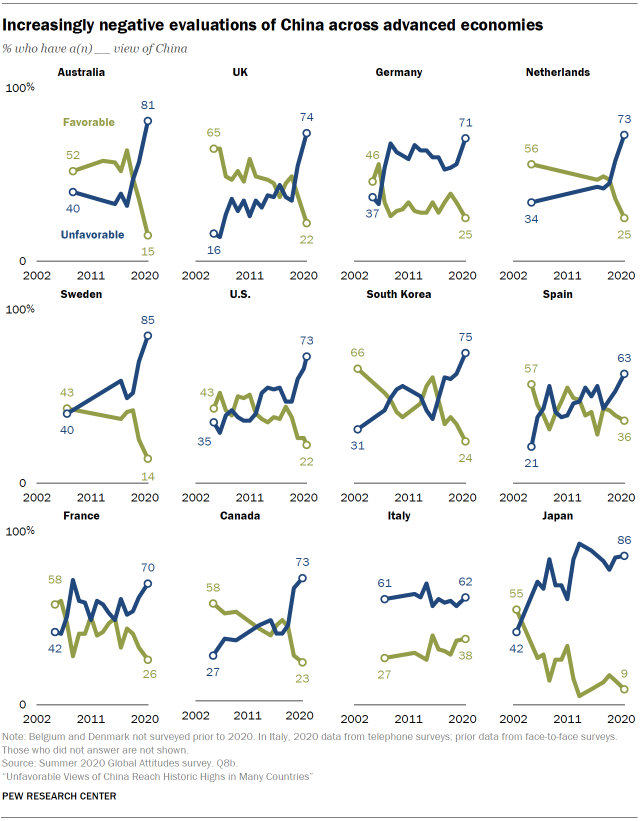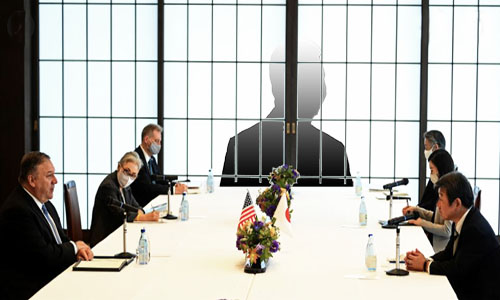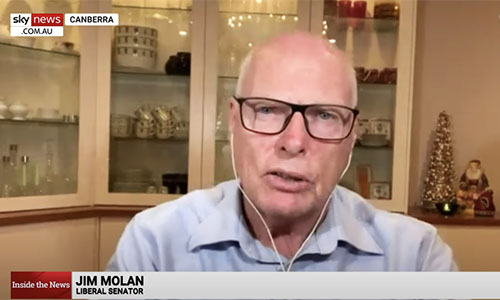
FOUR in five Australians now have an unfavourable view of China – an historic 24 per cent leap since the Coronavirus outbreak.
The survey, which focussed on advanced economies, was carried out by Pew Research Centre and suggested every nation surveyed had turned heavily against China.
Only Japan and Sweden are more distrustful of China than Australia with 86 and 85 per cent of their respective citizens holding an unfavourable opinion, representing an increase of one per cent and 15 per cent respectively over the same period.
UNFAVOURABLE
India was not included in the Pew survey, however, a study published by The Economic Times earlier this year showed almost 70 per cent of Indian citizens now viewed China as a greater threat than its traditional arch-enemy Pakistan.
With Japan and Sweden setting the high water mark in the Pew study, Australia was third with 81 per cent of respondents having an unfavourable opinion of China. Followed by South Korea at 75 per cent (up 12 per cent), the UK at 74 per cent (up 19 per cent) and the USA, Canada and Holland in equal sixth at 73 per cent (up 13, 6 and 17 per cent respectively).
Non-English speaking European nations rounded out the list with 71 per cent of German citizens unfavourable towards China (up 17 per cent), 70 per cent of the French (up 11 per cent), 63 per cent Spaniards (up 10 per cent) and 62 per cent Italian (up 5 per cent).
Sweden and the UK aside, anti-China sentiment is strongest among Indo-Pacific neighbours – suggesting strong popular support for the new Quad alliance among citizens of its member nations.
According to the head of National Security at Australian National University Prof Rory Medcalf the new security alliance has attracted enormous attention across Asia and beyond.
MILITARY
“It’s a potent combination,” Prof Medcalf wrote in last week’s Australian Foreign Affairs magazine.
“The four sides to this diplomatic polygon are Australia, Japan, India and the United States,” he wrote.
“These are respectively, the world’s 14th, third, fifth and single largest economies, and the 13th, ninth, third and single largest military spenders.
“Their agenda keeps expanding and now spans maritime, security, defence, infrastructure, investment, technology, cyber affairs, supply chains and public health.”
Prof Medcalf said the context of all Quad discussions was increasingly about China and its affront to sovereignty and rules-based order.
“Advocates see its promise in the potential to deter Chinese “adventurism,” he said.
“After all, its members’ collective defence budgets, populations and economies vastly outsize China’s, and this will continue whatever setbacks COVID-19 brings.
QUAD
“The Quad now matters so much that it is one of the few diplomatic arrangements in the world where policy leaders are willing to meet in person and accept the price of self-quarantine.”
Prof Medcalf said India had perfectly summarised the rationale for the Quads existence.
“As respected Indian analyst Tanvi Madan puts it: ‘If Beijing is wondering why these countries feel a quad might be necessary, it might want to look in the mirror.”PC












Hands up those who think Xi is interested in other countries’ opinion of him.
Xi’s power comes from within his country and within his party machinery. All the rest is noise.